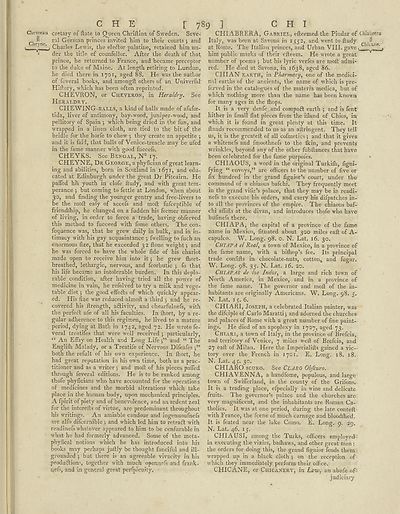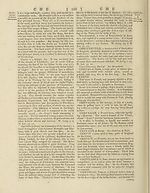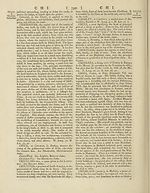Encyclopaedia Britannica, or, a Dictionary of arts, sciences, and miscellaneous literature : enlarged and improved. Illustrated with nearly six hundred engravings > Volume 5, BUR-CHI
(821) Page 789
Download files
Complete book:
Individual page:
Thumbnail gallery: Grid view | List view

CHE [ 789 J CHI
Chevreau creiary of ftate to Queen Chriflina of Sweden. Seve-
ral German princes invited him to their courts 5 and
. '' - ‘ . Charles Lewis, the elector palatine, retained him un-
i der the title of counfellor. After the death of that
prince, he returned to France, and became preceptor
to the duke of Maine. At length retiring to Lundun,
he died there in 1701, aged 88. He was the author
of feveral books, and amonglt others of an Univerfal
Hiftory, which has been often reprinted.
CHEVRON, or Cheveron, in Heraldry. See
Heraldry.
CHEWING-Balls, a kind of balls made of afafoe-
tida, liver of antimony, bay-wood, juniper-wood, and
pellitory of Spain ; which being dried in the fun, and
wrapped in a linen cloth, are tied to the bit of the
bridle for the horfe to chew ; they create an appetite ;
and it is faid, that balls of Venice-treacle may be ufed
in the fame manner with good fuccefs.
CHEYKS. See Bengal, N° 17.
CHEYNE, Dr George, a phyfician of great learn¬
ing and abilities, born in Scotland in 1671, and edu¬
cated at Edinburgh under the great Dr Pitcairn. He
paded his youth in clofe itudy, and with great tem¬
perance ; but coming to fettle at London, when about
30, and finding the younger gentry and free-livers to
be the mold eafy of accefs and mold fufceptible of
friendlhip, he changed on a fudden his former manner
of living, in order to force a trade, having obferved
this method to fucceed with fome others. The con-
fequence was, that he grew daily in bulk, and in in¬
timacy with his gay acquaintance ; fwelling to fuch an
enormous fize, that he exceeded 32 ftone weight; and
he was forced to have the whole fide of his chariot
made open to receive him into it 5 he grew fhort-
breathed, lethargic, nervous, and fcorbutic ; fo that
his life became an intolerable burden. In this deplo¬
rable condition, after having tried all the power of
medicine in vain, he refolved to try a milk and vege¬
table diet; the good eftedts of which quickly appear¬
ed. His fize was reduced almoft a third 5 and he re¬
covered his ftrength, aftivity, and chearfulnefs, with
the perfect ufe of all his faculties. In (hort, by a re¬
gular adherence to this regimen, he lived to a mature
period, dying at Bath in 1742, aged 72. He wrote fe-
veral treatifes that were well received ; particularly,
“ An ElTay on Health and Long Life and “ The
Englilh Malady, or a Treatife of Nervous Difeafes
both the refult of his own experience. In fiiort, he
had great reputation in his own time, both as a prac¬
titioner and as a writer 5 and molt of his pieces- palled
through feveral editions. He is to be ranked among
thofe phylicians who have accounted for the operations
of medicines and the morbid alterations which take
place in the human body, upon mechanical principles.
A fpirit of piety and of benevolence, and an ardent zeal
for the interells of virtue, are predominant throughout
his writings. An amiable candour and ingenuoufnefs
are alfo difcernible ; and which led him to retraft with
readinefs whatever appeared to him to be cenfurable in
what he had formerly advanced. Some of the meta-
phyfical notions which he has introduced into his
books may perhaps juftly be thought fanciful and ill-
grounded ; but there is an agreeable vivacity in his
produ&ionq together with much opennefs and frank-
qefs, and in general great perfpicuity.
CHIABRERA, Gabriel, efteemed the Pindar of Chiabrera
Italy, was born at Savona in 1552, and went to Iludy
at Rome. The Italian princes, and Urban VIII. gave.
him public marks of their efteem. He wrote a great
number of poems j but his lyric verfes are molt admi¬
red. Pie died at Savona, in 1638, aged 86.
CHIAN earth, in Pharmacy, one of the medici¬
nal earths of the ancients, the name of which is pre-
ferved in the catalogues of the materia mcdica, but of
which nothing more than the name has been known
for many ages in the (hops.
It is a very denfe and compaft earth 5 and is fent
hither in fmall flat pieces from the ifland of Chios, in
which it is found in great plenty at this time. It
Hands recommended to us as an ailringent. They tell
us, it is the greateft of all cofmetics 5 and that it gives
a whitenefs and fmoothnefs to the Ikin, and prevents
wrinkles, beyond any of the other fubllances that have
been celebrated for the fame purpofes.
CHIAOUS, a word in the original Turkilh, figni-
fying “ envoys,” are officers to the number of five or
fix hundred in the grand fignior’s court, under the
command of a chiaous bafchi. They frequently meet
in the grand vifir’s palace, that they may be in readi¬
nefs to execute his orders, and carry his difpatches in¬
to all the provinces of the empire. The chiaous baf¬
chi affifts at the divan, and introduces thofe who have
bufinefs there.
CHIAPA, the capital of a province of the fame
name in Mexico, fituated about 300 miles eaft of A-
capulco. W. Long. 98. o. N. Lat. 16. 30.
CHIAPA el Real, a town of Mexico, in a province of
the fame name, with a bifliop’s fee. Its principal
trade confifts in chocolate-nuts, cotton* and fugar.
W. Long. 98. 35. N. Lat. 16. 20.
CHIAPAS de los Indos, a large and rich town of
North America, in Mexico, and in a province of
the fame name. The governor and molt of the in¬
habitants are originally Americans. W. Long. 98. c.
N. Lat. 15. 6.
CHIARI, Joseph, a celebrated Italian painter, was
the difciple of Carlo Maratti j and adorned the churches
and palaces of Rome with a great number of fine paint¬
ings. He died of an apoplexy in 1727, aged 73.
Chiari, a town of Italy, in the province of Brefcia,
and territory of Venice, 7 miles weft of Brefcia, and
27 eaft of Milan. Here the Imperialifts gained a vic¬
tory over the French in 1701. E. Long. 18. 18.
N. Lat. 45. 30.
CHIARO scuro. See Claro Obfcuro.
CHIAVENNA, a handfome, populous, and large
town of Swifierland, in the county of the Grifons.
It is a trading place, efpecially in wine and delicate
fruits. The governor’s palace and the churches arc
very magnificent, and the inhabitants are Roman Ca¬
tholics. It was at one period, during the late conteft-
with France, the feene of much carnage and bloodfhed.
It is feated near the lake Como. E. Long. 9. 29.
N. Lat. 46. 15.
CHIAUSI, among the Turks, officers employed^
in executing the vizirs, baffiaws, and other great men :
the orders for doing this, the grand fignior fends them
wrapped up in a black cloth 5 on the reception of
which they immediately perform their office.
CHICANE, or Chicanery, in Lanjo, an abufe of
judiciary
Chevreau creiary of ftate to Queen Chriflina of Sweden. Seve-
ral German princes invited him to their courts 5 and
. '' - ‘ . Charles Lewis, the elector palatine, retained him un-
i der the title of counfellor. After the death of that
prince, he returned to France, and became preceptor
to the duke of Maine. At length retiring to Lundun,
he died there in 1701, aged 88. He was the author
of feveral books, and amonglt others of an Univerfal
Hiftory, which has been often reprinted.
CHEVRON, or Cheveron, in Heraldry. See
Heraldry.
CHEWING-Balls, a kind of balls made of afafoe-
tida, liver of antimony, bay-wood, juniper-wood, and
pellitory of Spain ; which being dried in the fun, and
wrapped in a linen cloth, are tied to the bit of the
bridle for the horfe to chew ; they create an appetite ;
and it is faid, that balls of Venice-treacle may be ufed
in the fame manner with good fuccefs.
CHEYKS. See Bengal, N° 17.
CHEYNE, Dr George, a phyfician of great learn¬
ing and abilities, born in Scotland in 1671, and edu¬
cated at Edinburgh under the great Dr Pitcairn. He
paded his youth in clofe itudy, and with great tem¬
perance ; but coming to fettle at London, when about
30, and finding the younger gentry and free-livers to
be the mold eafy of accefs and mold fufceptible of
friendlhip, he changed on a fudden his former manner
of living, in order to force a trade, having obferved
this method to fucceed with fome others. The con-
fequence was, that he grew daily in bulk, and in in¬
timacy with his gay acquaintance ; fwelling to fuch an
enormous fize, that he exceeded 32 ftone weight; and
he was forced to have the whole fide of his chariot
made open to receive him into it 5 he grew fhort-
breathed, lethargic, nervous, and fcorbutic ; fo that
his life became an intolerable burden. In this deplo¬
rable condition, after having tried all the power of
medicine in vain, he refolved to try a milk and vege¬
table diet; the good eftedts of which quickly appear¬
ed. His fize was reduced almoft a third 5 and he re¬
covered his ftrength, aftivity, and chearfulnefs, with
the perfect ufe of all his faculties. In (hort, by a re¬
gular adherence to this regimen, he lived to a mature
period, dying at Bath in 1742, aged 72. He wrote fe-
veral treatifes that were well received ; particularly,
“ An ElTay on Health and Long Life and “ The
Englilh Malady, or a Treatife of Nervous Difeafes
both the refult of his own experience. In fiiort, he
had great reputation in his own time, both as a prac¬
titioner and as a writer 5 and molt of his pieces- palled
through feveral editions. He is to be ranked among
thofe phylicians who have accounted for the operations
of medicines and the morbid alterations which take
place in the human body, upon mechanical principles.
A fpirit of piety and of benevolence, and an ardent zeal
for the interells of virtue, are predominant throughout
his writings. An amiable candour and ingenuoufnefs
are alfo difcernible ; and which led him to retraft with
readinefs whatever appeared to him to be cenfurable in
what he had formerly advanced. Some of the meta-
phyfical notions which he has introduced into his
books may perhaps juftly be thought fanciful and ill-
grounded ; but there is an agreeable vivacity in his
produ&ionq together with much opennefs and frank-
qefs, and in general great perfpicuity.
CHIABRERA, Gabriel, efteemed the Pindar of Chiabrera
Italy, was born at Savona in 1552, and went to Iludy
at Rome. The Italian princes, and Urban VIII. gave.
him public marks of their efteem. He wrote a great
number of poems j but his lyric verfes are molt admi¬
red. Pie died at Savona, in 1638, aged 86.
CHIAN earth, in Pharmacy, one of the medici¬
nal earths of the ancients, the name of which is pre-
ferved in the catalogues of the materia mcdica, but of
which nothing more than the name has been known
for many ages in the (hops.
It is a very denfe and compaft earth 5 and is fent
hither in fmall flat pieces from the ifland of Chios, in
which it is found in great plenty at this time. It
Hands recommended to us as an ailringent. They tell
us, it is the greateft of all cofmetics 5 and that it gives
a whitenefs and fmoothnefs to the Ikin, and prevents
wrinkles, beyond any of the other fubllances that have
been celebrated for the fame purpofes.
CHIAOUS, a word in the original Turkilh, figni-
fying “ envoys,” are officers to the number of five or
fix hundred in the grand fignior’s court, under the
command of a chiaous bafchi. They frequently meet
in the grand vifir’s palace, that they may be in readi¬
nefs to execute his orders, and carry his difpatches in¬
to all the provinces of the empire. The chiaous baf¬
chi affifts at the divan, and introduces thofe who have
bufinefs there.
CHIAPA, the capital of a province of the fame
name in Mexico, fituated about 300 miles eaft of A-
capulco. W. Long. 98. o. N. Lat. 16. 30.
CHIAPA el Real, a town of Mexico, in a province of
the fame name, with a bifliop’s fee. Its principal
trade confifts in chocolate-nuts, cotton* and fugar.
W. Long. 98. 35. N. Lat. 16. 20.
CHIAPAS de los Indos, a large and rich town of
North America, in Mexico, and in a province of
the fame name. The governor and molt of the in¬
habitants are originally Americans. W. Long. 98. c.
N. Lat. 15. 6.
CHIARI, Joseph, a celebrated Italian painter, was
the difciple of Carlo Maratti j and adorned the churches
and palaces of Rome with a great number of fine paint¬
ings. He died of an apoplexy in 1727, aged 73.
Chiari, a town of Italy, in the province of Brefcia,
and territory of Venice, 7 miles weft of Brefcia, and
27 eaft of Milan. Here the Imperialifts gained a vic¬
tory over the French in 1701. E. Long. 18. 18.
N. Lat. 45. 30.
CHIARO scuro. See Claro Obfcuro.
CHIAVENNA, a handfome, populous, and large
town of Swifierland, in the county of the Grifons.
It is a trading place, efpecially in wine and delicate
fruits. The governor’s palace and the churches arc
very magnificent, and the inhabitants are Roman Ca¬
tholics. It was at one period, during the late conteft-
with France, the feene of much carnage and bloodfhed.
It is feated near the lake Como. E. Long. 9. 29.
N. Lat. 46. 15.
CHIAUSI, among the Turks, officers employed^
in executing the vizirs, baffiaws, and other great men :
the orders for doing this, the grand fignior fends them
wrapped up in a black cloth 5 on the reception of
which they immediately perform their office.
CHICANE, or Chicanery, in Lanjo, an abufe of
judiciary
Set display mode to:
![]() Universal Viewer |
Universal Viewer | ![]() Mirador |
Large image | Transcription
Mirador |
Large image | Transcription
Images and transcriptions on this page, including medium image downloads, may be used under the Creative Commons Attribution 4.0 International Licence unless otherwise stated. ![]()
| Permanent URL | https://digital.nls.uk/192994942 |
|---|
| Attribution and copyright: |
|
|---|
| Description | Ten editions of 'Encyclopaedia Britannica', issued from 1768-1903, in 231 volumes. Originally issued in 100 weekly parts (3 volumes) between 1768 and 1771 by publishers: Colin Macfarquhar and Andrew Bell (Edinburgh); editor: William Smellie: engraver: Andrew Bell. Expanded editions in the 19th century featured more volumes and contributions from leading experts in their fields. Managed and published in Edinburgh up to the 9th edition (25 volumes, from 1875-1889); the 10th edition (1902-1903) re-issued the 9th edition, with 11 supplementary volumes. |
|---|---|
| Additional NLS resources: |
|

